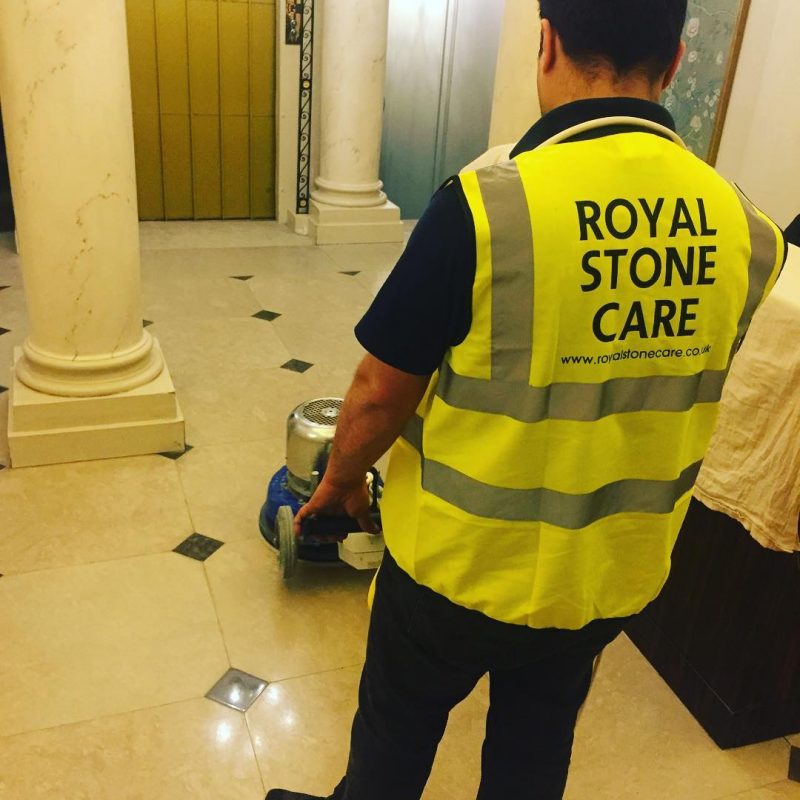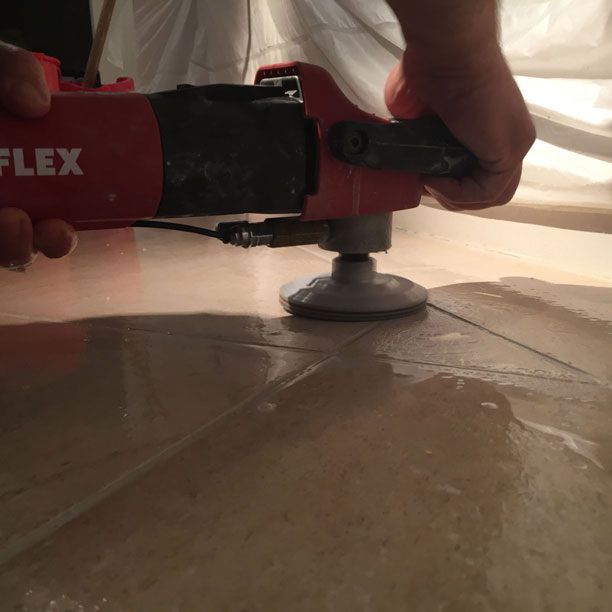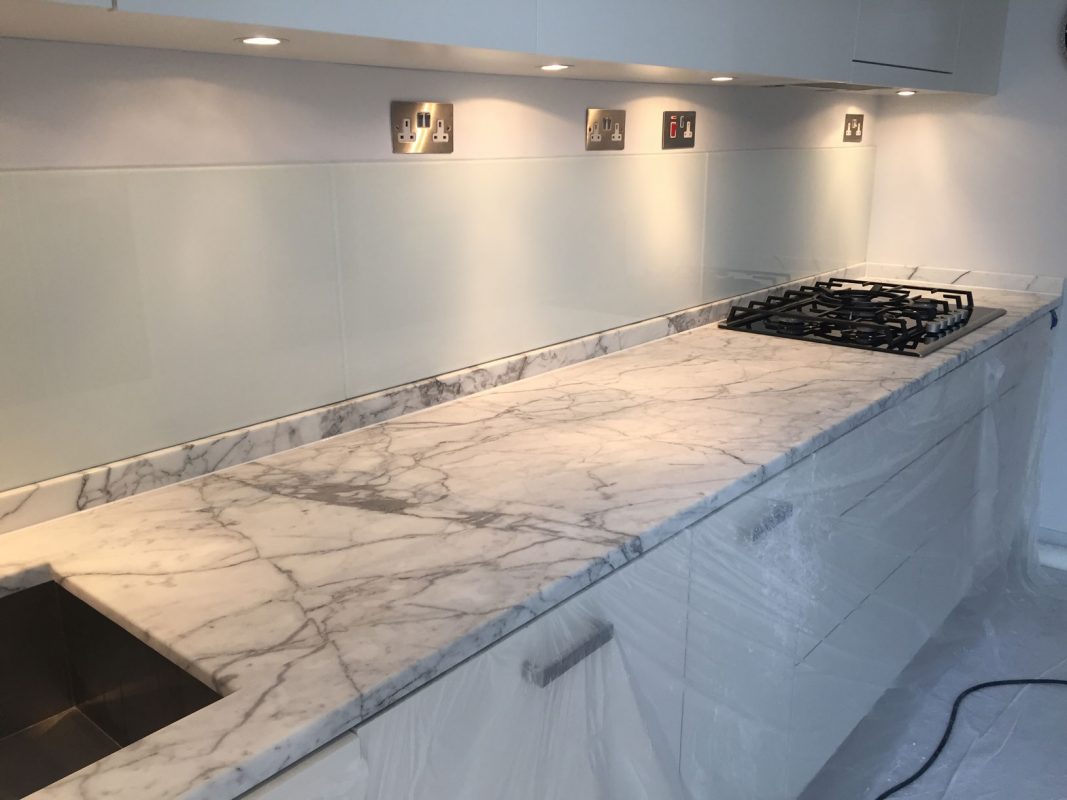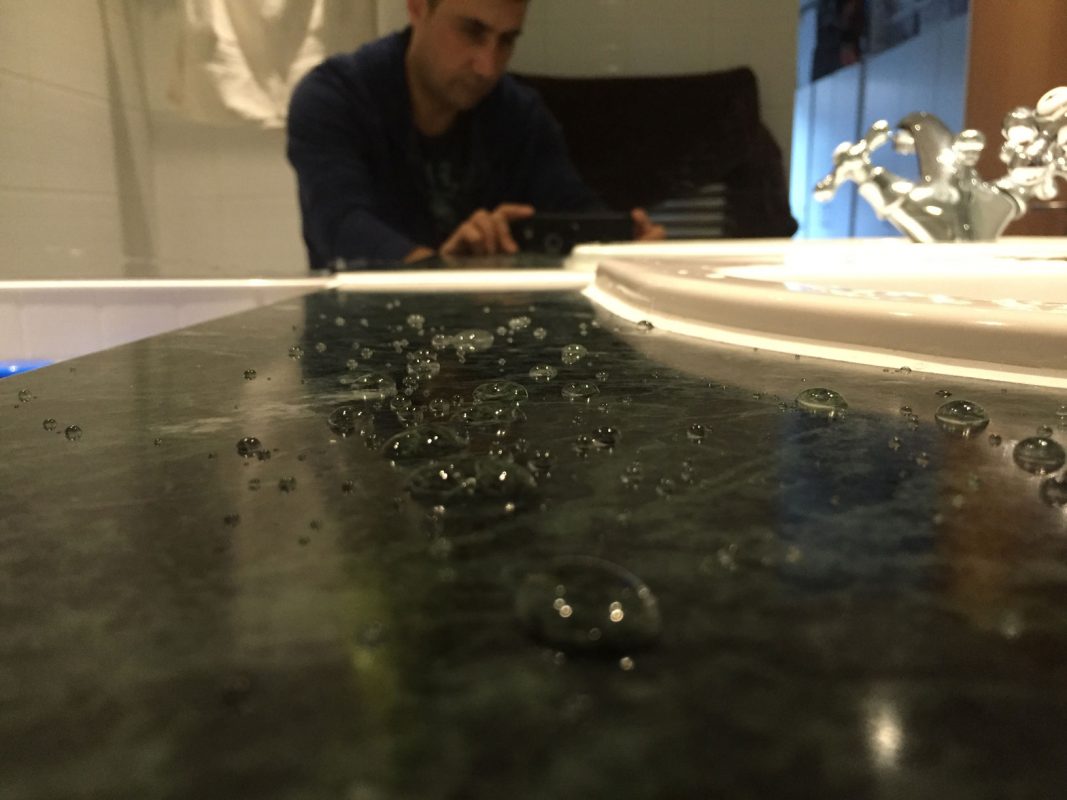Marble restoration and repair service
Royal Stone Care is a certified natural stone expert, trusted by thousands of residential and commercial clients across London and the UK.
Get a free quoteOn this page
Caring for your marble: Why it matters [2026 Guide]
Marble is a metamorphic stone derived from limestone and other sedimentary rocks which have been exposed to intense heat and pressure. It’s been used in building for millennia, yet its popularity shows no signs of diminishing.


Where do you tend to see marble?
Stylish, versatile and long-lasting, marble is no longer the exclusive preserve of the wealthy. You’ll find it in myriad different applications, from kitchen worktops and fireplaces to floors and bathroom vanity units, among others. And neither are these settings confined to private homes – hotels and business reception areas, for example, are increasingly incorporating this gorgeous natural stone.
Why marble sometimes need a little TLC
Wonderful though this material looks, like anything else it needs a little regular TLC for it to stay looking its glorious best and to preserve its natural beauty. And if you’re wondering why marble maintenance is essential, really it’s because this stone is porous, and so can be susceptible to damage if you’re not careful, especially in high-traffic areas.
So without proper marble care, over time you may find spillages of food products and anything acidic or oil-based could stain your stone. The potential culprits include citrus juices and vinegar plus common household cleaning chemicals – all of which can damage the surface of your marble and affect its longevity.
What is marble etching?
Etching is a physical harm which happens when your marble comes into contact with acidic substances. (It’s not the same as staining or discolouration – etching is a corrosive process that takes away the marble’s superficial layer.)
What are some of the other marble common problems?
And if you have outdoor marble, it’s also susceptible to the effects of air-based pollutants. Meanwhile, fading and dullness are other fairly common issues which can crop up over time; another is scratching. Equally, chipping can occur when concentrated force is applied to a small area, since marble is composed mainly of calcium carbonate and so is quite brittle.
But regular cleaning and maintenance, including a weekly once-over and a deeper clean perhaps every year or so, ideally from a professional marble care company, keep your stone in tip-top condition and prevent a build-up of grime or polish on the surface.
Equally, you potentially save money as this works out far cheaper than a full restoration job.
Common marble problems and how to fix them
Marble chips, scratches and cracks
There are various common causes of marble chipping, including impact from hard objects. You may, for example, accidentally drop something heavy on the stone’s surface, or hit its edges with a utensil. Marble also chips under excessive pressure, especially at its more vulnerable corners. Other possible causes include fluctuations of temperature or high humidity. Equally, if the sealant has not been applied properly, this can also weaken the stone.
But there are a number of things you can do, including:
- Sealing your stone properly and regularly to create a protective layer designed especially for marble.
- Don’t drop heavy things on your stone!
- Use mats anywhere you might place a weighty item, for example under pots and pans or furniture legs for marble flooring.
- Be careful when you move objects near the edges, which are more vulnerable to chipping.
- Use a protective cover during any renovation or construction project.
- Use soft cloths and cleaning solutions specifically designed for marble.
Many of the above causes – lack of sealing, dragging objects across the surface and improper cleaning methods – can also lead to scratches on marble. Equally, dirt and debris can be abrasive.
So regular cleaning using soft cloths plus protective mats and coasters and protective sealants are all good preventative measures.
What about marble cracks?
As for cracking, water can penetrate marble and weaken it, leading to this problem. There could also be natural faults in the stone; it may have been fitted using the wrong methods, or temperature fluctuations may have caused expansion or contraction of the stone. Heavy loads and exposure to some chemicals can also play their part.
To avoid cracks, choose a premium-quality stone with minimal natural flaws and follow the preventative measures outlined above.
Marble stains from wine, lemon or coffee
When it comes to permanent staining, the main culprits include acid-containing fluids such as citrus-based juices, wine, coffee and some cleaning products if the marble’s porous surface absorbs these. So don’t leave anything on the surface like this which could stain it. If you accidentally stain the marble, contact our experts, sometimes we can advise you over the phone on how to fix it yourself, free of charge.
Additionally, be wary of cleaners such as Viakal, which are acid-based and so not suitable for use on natural stone. (Viakal is a limescale remover containing phosphoric, ethedronic and formic acids.) It can be quite damaging on marble, and leave a white etching on the surface of the stone.
Natural solution to clean marble
So, instead, consider more natural solutions, such as blotting stains or using a pH-neutral cleaner or baking soda paste. For this option, called a poultice, combine the baking soda with a little water to make a thick paste before placing it directly on the stain. Cover with plastic and leave for 24 hours. Next, remove the paste and rinse the area before drying the surface using a soft, lint-free cloth.
Fading and dullness
Over time, years even, the sun’s UV rays can fade the colour of your marble, making it looking noticeably duller. Equally, everyday wear and tear, poor cleaning and dirt and debris call also dull this stone.
As ever, the best way of tackling these issues is through regular cleaning with a mild, pH-neutral stone cleaner and a soft cloth, and being sure to dry thoroughly afterwards. A marble sealant provides protection from further fading. If the problem is significant, call in the experts for professional polishing and resealing.
Request a free quote

Services we offer for marble care
Marble restoration
This is all about restoring and improving a damaged marble surface while preventing future damage. The process fully restores the natural smoothness and shine of worn or damaged stone, whether you’re restoring marble floors or anything else.
Marble restoration services including:
- Marble polishing to restore shine.
- Honing: To make the surface more even.
- Grinding: Using industrial diamonds to remove the stone’s upper layers to shift stains and scratches.
- Removing stains: Specialists use cleaning agents to shift stains and etching – a chemical reaction which damages the stone’s surface when it comes into contact with acidic surfaces.
- Repair: Including any chips, cracks, dents, scuffs and holes.
Once the process is complete, you can look forward to enhanced durability and stain protection and easier maintenance, as well as vastly improved appearance.
Marble polishing
Marble polishing works to make your stone look brighter, particularly if it has become yellow in colour or opaque, and especially if it has been exposed to direct sunlight. Regular foot traffic, everyday grime and so on can also cause this material to lose its shine.
Why should you polish marble, and how often should it be done?
Polishing marble floors and other surfaces gets rid of superficial scratches and stains since the top layer of the stone is removed as part of the process. Professional marble polishing services have the equipment, including abrasive tools and polishing compounds, to restore a smooth and shiny look to your stone.
Essentially, with polishing, not only does your marble look better but it also helps its longevity, and makes general upkeep easier, since it is less likely to stain or develop chipping or scratches. Plus it will be denser than the unpolished version.
How often you polish your marble will depend on its location and how heavily you use the area it’s in. Equally, softer varieties of this stone may need more frequent attention. But you’ll probably want a professional polishing at least once or twice a year.
Marble repair
Cracks can develop in marble, ranging in size from hairline to large fissures. And they can be due to pressure, impact or incorrect fitting of the stone. Meanwhile, as a naturally porous substance with a crystalline structure, marble can be vulnerable to damage from impact, particularly on the edges, if it is struck by something hard.
You’ll often see cracks and chips together so they have similar solutions. Sometimes, you can hide these flaws with a good clean and polish. But if you have more widespread damage, and the imperfections are very noticeable, it’s time to call in the experts to ensure a seamless restoration.
How professionals repair marble?
Professional marble chip repair works by using a paste of natural stone and special adhesives to fix cracks and chips. It will be used as a filler and will be the same colour as the existing stone. Sanding and polishing then complete the job.
If you’re looking for marble repair near you, make Royal Stone Care your first port of call. We cover Greater London and sometimes travel across the UK. We’re also happy to advise you on how to fix it yourself or help you find professionals near you.
Marble cleaning
Regular marble cleaning, as mentioned, is hugely important. And while you can give your stone a routine once-over yourself, you’ll find that regular attention from professional marble cleaning services will make a huge difference, for cleaning marble floors, kitchen worktops and more.
Cleaning helps to maintain the shine of the stone, prevents damage from staining and scratching and increases marble’s longevity while leaving it streak-free.
How do we tackle the marble cleaning job?
We will use a variety of techniques to removed ingrained dirt and stains safely, including vacuuming, damp-mopping with pH-neutral solutions and spot-cleaning with mild detergents. Above all, they’ll avoid abrasive or acidic cleaners. They may also use a rubbing alcohol solution.
The best service providers will invest in both the most up-to-date equipment and learning the newest techniques.
These include rotary cleaning machines – heavy-duty and mechanised, making it ideal for large surface areas. This is often combined with good old-fashioned elbow grease for corners and crevices, which the machines may not reach.
The next step is typically marble-grinding machinery using abrasive pads of increasingly finer grades. These pieces of equipment have diamond blades to remove deep stains, scratches and lippage or unevenness, so that the stone is then ready for honing and polishing. The final abrasive pad creates a smooth and glossy, good-as-new finish that complements marble’s natural hue.
With pro cleaning, even marks that may have seemed impossible to shift can be eradicated.
Marble surfaces we work on
Marble floors
Over time, marble floors, especially those which have heavy foot traffic, can become scratched and dull-looking. There may also be staining and etching. So to extend their beauty and lifespan and, again, prevent damage, you need high-quality professional attention once or twice a year.
This will take care of any marble floor repair you need, while polishing marble floors gives these surfaces back their sheen and lustre. At the same time, you’ll be protecting your investment.
How to clean marble floor?
We use techniques such as steaming and buffing to lift grime and dirt without harming the delicate surface of this stone. Equally, we stick to pH-neutral or mild alkaline products, avoiding anything acidic or soap-based.
In some cases we use a mop and bucket, but we know how to work without harming the marble. Steam cleaning gets deep into the stone’s pores and can remove grime, dirt and staining without heavy chemicals. Polishing marble floors with buffing eliminates watermarks or cleaning solution streaks – we work a soft, dry cloth in a circular motion.
Marble worktops
Cleaning marble worktops in the kitchen and bathroom is generally pretty straightforward on a daily level if no dirt has built up. And you can do this yourself with a soft, dry microfibre cloth and a mild detergent. And you can combine this with a deep clean every few months from a professional firm like ours, to keep your marble in top-top condition.
Marble worktop restoration, as described above, is what you need if the surface of your marble has become damaged, and, again, this is generally a job best left to the experts.
Marble fireplaces
It’s no wonder marble fireplaces are so popular. They combine timeless elegance with functionality and longevity, while providing a space with a clear focal point.
Once again, you can do your bit with regular cleaning and polishing marble fireplaces with a soft, damp cloth and pH-neutral cleaner while giving harsh chemicals and acid-based substances such as lemon juice and vinegar a swerve. You can also seal the stone to help ward off the effects of water damage and staining.
How we repair and restore marble fireplace
When it comes to marble fireplace repair, it’s time to get in the pros. We have the expertise, staff and equipment to do a spot-on job every time. We’ll use gentle, non-abrasive techniques to remove dust, including working with microfibre cloths. We’ll also use marble-specific cleaners or warm water and washing-up liquid, while steering clear of harsh chemicals.
We’re also experts in removing all kinds of stains and filling chips and cracks with resin or epoxy and polishing your fireplace to restore its original shine. After all, we have access to the best specialist methods and materials.
Marble tables
Marble tables, either coffee or dining models, add class and elegance to any room – these items also withstand heat and scratches well.
Marble table cleaning from Royal Stone Care
We tackle stains with poultices, which are pastes of baking soda or hydrogen peroxide with water or ammonia, which we apply to the stain and then leave to draw it out. We’re experts at restoring marble tables, even those with deep etching, and professional marble table polishing. We have the equipment, products and techniques to restore a brilliant shine and eliminate dull spots or scratches.
Marble bathrooms
Marble bathrooms have a glamorous, timeless appeal, boost the value of your property and are easier to clean than you may have realised. So no wonder they’re so popular. Again, we specialise in marble bathroom restoration and the like, whether you’re a business or a private home, and wherever you’re based in the UK. So consider marble shower tiles, flooring, vanity units and so on – there are myriad colours and designs to choose from.
Our best tips for cleaning marble bathrooms
When it comes to cleaning marble bathrooms, including vanity units and shower areas, all the usual tips apply. Use washing up liquid and warm water in a spray bottle and give it a good shake. Spray the tiles, shower or vanity unit, taking care not to saturate the surface. Then wipe down with a soft, wet cloth. Finish up by using a dry towel or cloth over tiles and grouting until the surface is completely dry. Repeat the process every week.
Be proactive with staining. Use a soft cloth as soon as you spot a mark – dab in gentle motions so that you don’t move the stain anywhere else on the marble. Rinse and repeat as many times as you need to. If a stain lingers, mix 12% hydrogen peroxide with a few drops of ammonia and apply to the affected area with a cloth. Remove with a damp towel before drying thoroughly.
Why regular marble maintenance is essential
Regular marble maintenance such as polishing, resealing, cleaning and so on, is vital. Here’s why:
- Preserve your marble’s natural beauty: Over time, marble can become stained, dull or scratched – so you need to appreciate how to maintain marble to protect it and keep its shine.
- Longevity: Proper marble maintenance makes your stone last for longer and helps prevent future damage.
- Reduce accident risk: A grimy or slippery surface can lead to trips and falls. So professional marble maintenance helps avoid accidents and the potential associated liability claims.
- Save time and money: Unless you happen to have the right skills yourself, caring for your marble can be expensive and time-consuming. A professional company will have all the right staff, kit, expertise, products and experience to do an outstanding job every time.
Protect your marble with anti-slip and coating solutions
Anti-slip marble treatment solutions and marble protective coatings improve traction, particularly when it’s wet, and protect the surface of your stone from stains and other damage.
The better grip makes marble floors safer to walk over, and this will enhance peace of mind, especially in high-traffic areas or where people can tread in moisture from outside. At the same time, protective coatings serve as a barrier, safeguarding the stone from scratches, staining and similar damage. You also extend your marble’s lifespan, and make cleaning easier by stopping dirt and grime from becoming embedded in the surface.
Finally, some treatments, including those for polished marble, also make the stone more water-resistant – another bonus.
Who we help
Over the years, we’ve served an extensive portfolio of clients – and continue to do so:
-
Private dwellings
We provide a full suite of marble services for homeowners across the UK’s capital and beyond, whether you have a marble bathroom, backsplash, staircase, shower, floor, kitchen worktop, fireplace or anything else. Our services encompass marble cleaning, sealing, renovation and more, alongside a number of specialist marble care services.
We can also help, by the way, if you’re a landlord letting out a property.
-
Commercial marble restoration
Again, our clients are very wide-ranging and our offering includes marble care for hotels as well as places like embassies and offices plus a variety of retail environments, where the stone clearly has to look its best and where it must typically withstand a high volume of foot traffic. Equally, we work with businesses such as estate agents and banks, which welcome customers on-site, as well as historic premises.
So we’re used to dealing with everyone from householders to facilities managers, contractors and others.
The types of marble we work with
When it comes to working with varied types of marble, we’re well versed in everything from Carrara marble restoration to Calacatta marble repair, and so have demonstrable expertise in all varieties of this gorgeous natural stone. Here are some examples of the marble types we work with – the list is not exhaustive and, as mentioned, we work with all marble types.
- Carrara: Called Luna marble in Ancient Rome, this white or blue-grey marble is popular in building décor as well as sculpture.
- Calacatta: People love this marble variety, famous for its unique veining in grey and gold, plus its natural patterns and bold white colour.
- Nero Marquina: This type features dramatic white veining against a dark background, and is particularly striking with a polished finish – a genuine showstopper!
Your marble questions answered
Got a query on marble care? Here, we aim to answer your marble FAQs and questions about how to clean marble, while throwing in some marble repair tips. However, if you can’t find your question here, please get in touch and our marble experts will advise you free of charge.
How often should I polish marble?
The frequency of marble polishing depends to a large extent on things like location and the volume of foot traffic, especially with marble flooring. But, as a general rule of thumb, it makes sense to go for a professional marble polish roughly once or twice a year, and to have your stone sealed or resealed at the same time. In between times, you can probably take care of most day-to-day cleaning yourself.
Can marble scratches and chips be repaired?
Yes, that’s often the case. Indeed, for minor damage, there are DIY solutions such as tin oxide polishing powder or a high-quality marble polishing powder to shift scratches that don’t run too deep into the stone.
Dealing with minor marble flaws
For small chips, consider epoxy or filler products – but just be sure the colour matches the marble. At the same time, restoring the polish can help hide minor scratches and chips.
Why call in a marble specialist?
For more significant damage, call in the professionals. That way, you ensure a consistent finish for deeper scratches or gouges. The pros have all the right techniques, expertise and materials such as colour-matched fillers and resins, to fix bigger cracks and chips. Or they may use metal rods or adhesives where the damage is structural.
Finally, a specialist can seal and polish the affected area post-repair, so that it blends in seamlessly with the surrounding stone.
What’s the best way to clean marble?
For daily cleaning, mix a little pH-neutral washing-up liquid and warm water in a bucket or bowl before gently wiping the marble surface. Next rinse the cloth thoroughly and wipe your stone with clear water to lift off any soapy residue. Finish by drying well with a soft cloth to stop watermarks from forming.
You will need to wipe down marble surfaces regularly to stop grime and dirt from building up.
And what about dealing with marble stains?
A dilute solution of washing-up liquid should also be enough to break up milder stains. For tougher marks, form a paste with baking soda and water. Apply to the stain, leave for a few hours or overnight before gently wiping and rinsing.
You can also apply hydrogen peroxide on lighter areas, which you then cover with a plastic wrap before, again, leaving for a number of hours. Remove and then complete the rinsing and drying process mentioned above.
Cornflour can be effective on oil-based staining – allow the product to soak up as much of the spillage as possible before rinsing and drying.
How to seal marble?
You should also consider sealing your stone, and resealing regularly. (This ideally needs to be professionally done.)
Finally, our top marble care tips are to steer clear of harsh chemicals or anything acid-based, and always address any spillages promptly. Stick to microfibre cloths – don’t use rough scourers which can scratch.
Why use Royal Stone Care?
You may be wondering why choose us for marble care. In fact, there are a number of reasons to hire Royal Stone Care, the trusted marble experts:
-
We are Certified
We take our duties to the environment very seriously and have achieved several high standard certificates. That means we don’t use any harmful chemicals in our stone cleaning services and work.
-
Quality guaranteed
Our work is 100% guaranteed, so you can’t lose. We’re fully covered by public liability insurance, and use only highly skilled, trained and experienced craftsmen who know what they are doing. We have our own tried and tested techniques, including our unique diamond pads which completely remove all marks and scratches. We also apply our sealer/impregnator to provide ongoing protection from everyday spillages and to keep your stone looking consistently flawless.
We understand each of the stones we work with in detail, and what they need to stay looking their best. So we’ll work with you to come up with the best care plan for your requirements.
Our service is prompt and efficient, and more cost-effective than you may have realised, especially if you choose one of our maintenance plans providing year-round stone care anywhere in the UK for a single annual fee.
Contact us for expert marble services
Make us your trusted partner for marble care. Book your free consultation today and join thousands of happy customers!
